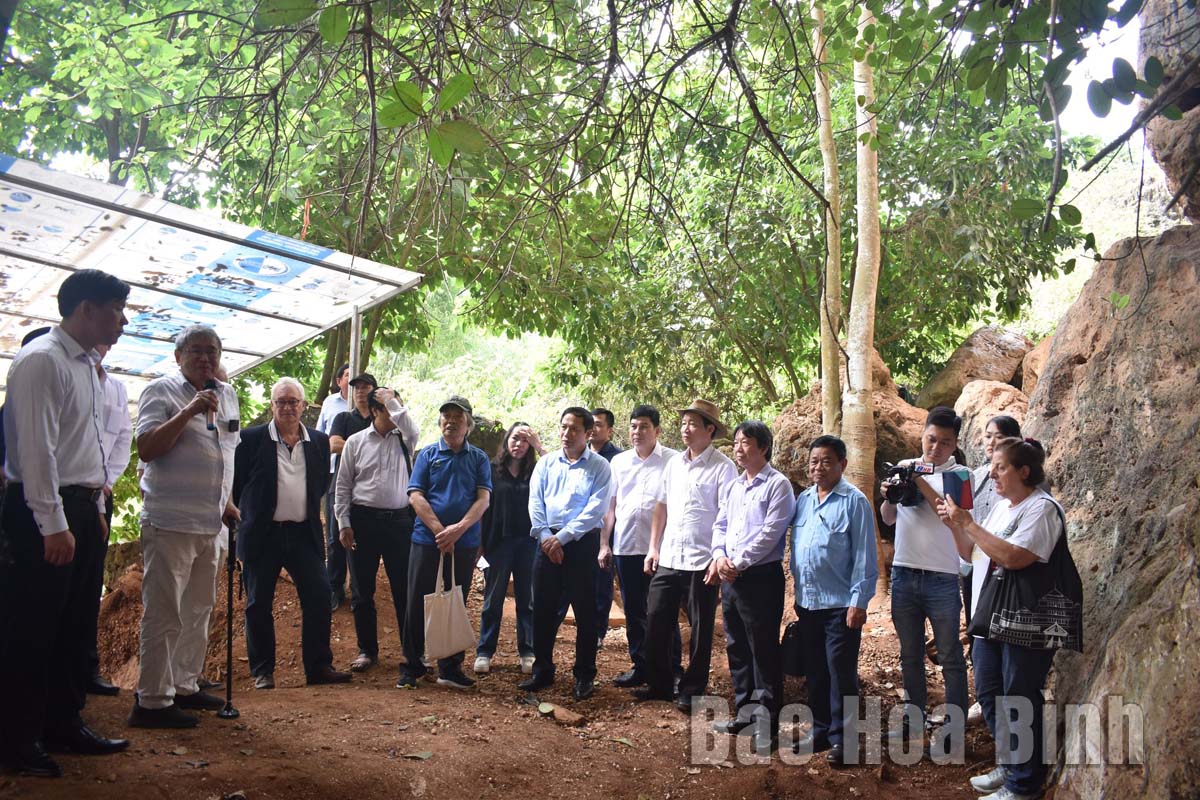
(HBO) – The organising board of a workshop marking 90 years since the world’s recognition of the Hoa Binh Civilisation held a tour of some typical archaeological sites of this civilisation on November 22. Participants included officials of the Ministry of Culture, Sports and Tourism, the ministry’s Cultural Heritage Department, the Institute of Archaeology, the Vietnam Archaeological Association, and domestic and foreign scientists. Vice Chairman of the Hoa Binh provincial People’s Committee Nguyen Van Toan, officials of some departments and sectors, and representatives of the Lac Son district People’s Committee also joined the delegation.

The delegation visits the Vanh Village stone shelter,
a relic site in Yen Phu commune of Lac Son district.
The delegation visited the Trai Hamlet cave in
Tan Lap commune and the Vanh Village stone shelter in Yen Phu commune, which
are typical archaeological sites of the Hoa Binh Civilisation. The Trai Hamlet
cave, discovered in 1975, has been excavated and studied for many years.
Research findings show that it dates back to the Hoa Binh Civilisation in the
Stone Age. In 2001, it was recognised as a national archaeological site.
Scientists found entrances to the cave in 2004 and 2008. Aside from stone tools
and food vestiges typical for the Hoa Binh Civilisation, many beautifully
decorated ceramic pieces and sharpened axes dating back 3,500 - 3,200 years
have also been unearthed at this cave.
Meanwhile, the Vanh Village stone shelter was
found by French archaeologist M. Colani in 1929 during an archaeological survey
of the southern limestone mountain area of Hoa Binh province. As many as 951
objects were collected there. In addition to hewn tools, a large number of
sharpened tools and stone bracelets were also discovered. According to the
study results announced in 1930, this relic site dates back about 17,000 -
8,000 years and belongs to the Hoa Binh Civilisation. Therefore, it was
classified as a site of the middle period of the civilisation.
During the tour, Dr. Nguyen Viet, Director of
the Centre for Prehistoric Southeast Asian Studies, updated participants on the
2022 excavation, which has given a further insight into the Hoa Binh
Civilisation. The latest research efforts revealed that this civilisation was
much older and more diverse than what have been known so far. Given this, more
interesting findings are expected in the future./.
With an increasingly vibrant and widespread emulation movement aimed at building cultured residential areas and cultured families, Yen Thuy District has been making steady progress toward improving both the material and spiritual well-being of its people, while fostering a civilized, prosperous, beautiful, and progressive community.
Once lacking recreational spaces and community facilities, Residential Group 2 in Quynh Lam Ward (Hoa Binh City) has recently received attention for the construction of a new, spacious, and fully equipped cultural house. The project followed the model of state support combined with public contributions in both labor and funding.
The "All people unite to build cultural life" movement, which has been effectively integrated with Kim Boi district’s socio-economic development goals, is fostering a lively spirit of emulation across local residential areas, hamlets, villages, public agencies, and enterprises. In addition, through the initiative, traditional cultural values are being preserved and promoted, while community solidarity and mutual support in poverty reduction and economic development are being strengthened.
A working delegation of the Hoa Binh provincial People’s Committee led by its Permanent Vice Chairman Nguyen Van Toan on June 11 inspected the progress of a project to build the Mo Muong Cultural Heritage Conservation Space linked to tourism services in Hop Phong commune, Cao Phong district.
Born and growing in the heroic land of Muong Dong, Dinh Thi Kieu Dung, a resident in Bo town of Kim Boi district, in her childhood was nurtured by the sweet lullabies of her grandmother and mother. These melodies deeply imprinted on her soul, becoming an inseparable part of her love for her ethnic group's culture. For over 20 years, this love for her hometown has driven Dung to research, collect, and pass down the cultural values of the Muong people to future generations.
In the final days of May, the Ethnic Art Troupe of Hoa Binh Province organized performances to serve the people in remote, mountainous, and particularly disadvantaged areas within the province. These were not just ordinary artistic shows, but they were the meaningful journeys aimed at spreading cultural values, enhancing the spiritual life of the people and contributing to the preservation of ethnic minority cultural identities.



